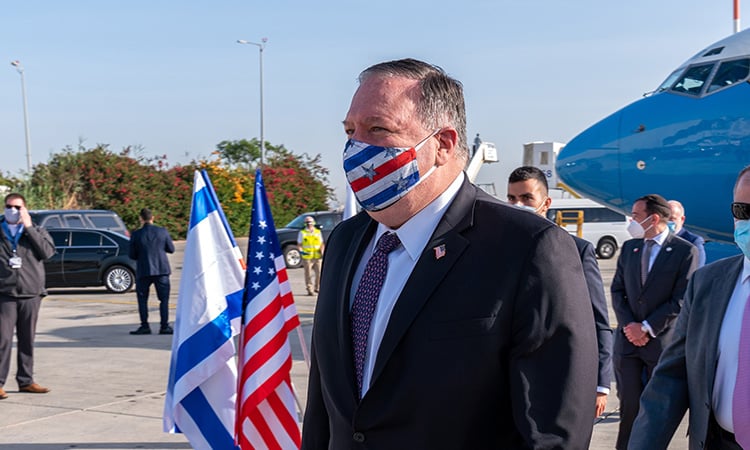
TEL AVIV: The United States delivered a clear message to Jerusalem today – avoid further involvement of China in the Israeli economy. The message was one of the main reasons for the very short visit of American Secretary of State Mike Pompeo to Jerusalem — one day before the new cabinet is sworn in.
“The fact that the visit takes place in these problematic times proves its urgency ” an Israeli source said. Pompeo came to Israel with a very strict message – stop all Chinese investment in Israel, either in high tech companies or infrastructure.
Israeli officials said the message relayed during Secretary of State Mike Pompeo’s hours-long visit included a very specific political warning – Israel must stop any action that strengthens the Chinese Communist Party, even if that means canceling projects already planned.
Israeli sources said that the strict demand also stems from the suspicion in Washington that China is responsible for the effects of the coronavirus.
Good relations between Israel and China have caused heartache in the relationship between Washington and Jerusalem. For example, Israel was forced to cancel the sale of the Phalcon Airborne Early Warning System to China during the Camp David summit after money had changed hands. Israel was forced to compensate China for the cancellation.
As Breaking D readers know, Israel’s National Authority for Data Protection barred China from building communications infrastructures of any kind in the country, and Israeli communications companies are not using Chinese components in their communications equipment. The new directive will force big companies and organizations with national security implications to refrain from using Chinese made systems and components in their different installations.
But sources familiar with the issue say the steps that have been taken are not enough. “The Chinese use their resources to try and integrate into many Israeli infrastructure projects, especially on the communications and security aspects and that causes big worries” one expert here told me.
A document prepared by the intelligence community shows that there has been an increase of more than 1,700% in Chinese investment across the Middle East from 2012 to 2018.
Government officials and private sector experts estimate that Chinese investment in Israel has reached 40 billion shekels ($11.4 billion) over the years. Chinese companies bought one of Israel’s largest dairy products companies, and have won tenders and operating franchises to build the Carmel tunnels in Haifa, the Ashdod and Haifa ports and the Tel Aviv Light Train.
The Israeli security organizations are very concerned about Chinese involvement, especially at two strategic sites where the sensitivity is particularly high. One is control of the light train now being built here that passes close to Kirya, the site that includes the Ministry of Defense, IDF headquarters and the air force’s high command.
Israeli sources told Breaking Defense that the new demands by the US will create problems in some major infrastructure projects. They concede that not complying with the U.S demands will have worse results for Israel.
The issue of the Chinese involvement in Israeli programs became even more acute as Beijing strives to get big chunks of work part of the rebuilding of Syria after the long civil war. Russia has sent signs to that it is not happy with Syria’s willingness to consider Chinese bids.
Professor Uzi Rabi, director of the Moshe Dayan Center for Middle Eastern and African Studies, told me that the Russians expected that Assad will be open to all their demands after their investment in the Syrian civil war “Now, when the Russians are in a very bad situation due to the combination of the coronavirus and low oil prices, they discovered that Assad is playing power games. That angers Moscow very much.”
Moscow is using all its tools to be the main contractor to rebuild ruined Syria after the long civil war. In recent days, Russian publications have described Assad as a weak man, unable to deal with corruption and one that has completely lost the confidence of the business community in his country. The results of a public opinion poll conducted by a Russian Institute shows that only 32 percent of Syrian citizens will vote for Assad next year. The credibility of that poll cannot be measured but the line is clear. (Eds. note: Of course, Assad is demonstrably unpopular, since much of the population has spent years trying to kill him and his minions.)
The message from Moscow is very clear: we helped you when you needed it most. Now you have to help us.
As Pentagon awaits supplemental dollars, its operational funding is $2B in the hole
The House is teeing up a series of votes this weekend on separate supplemental spending bills for Israel, Taiwan and Ukraine.


























